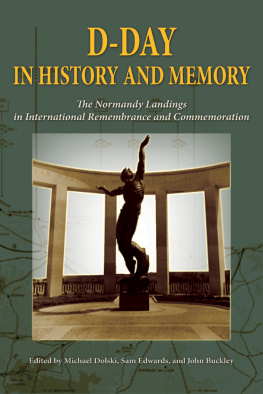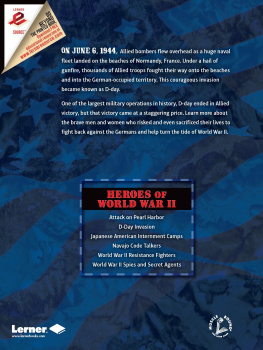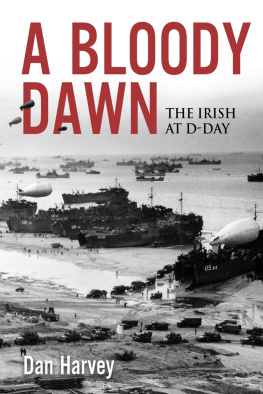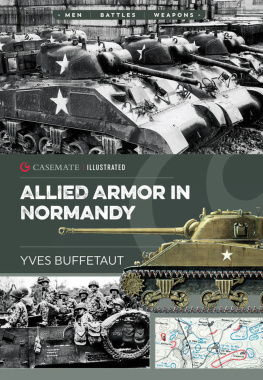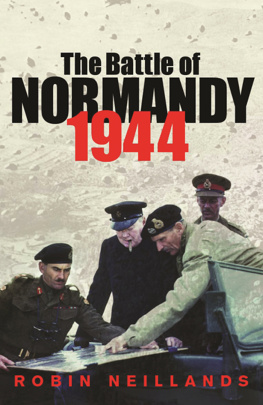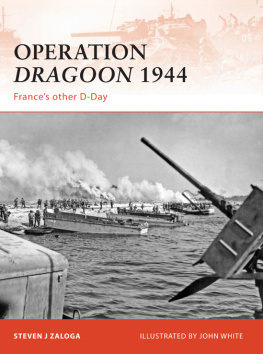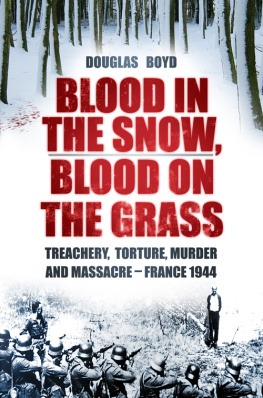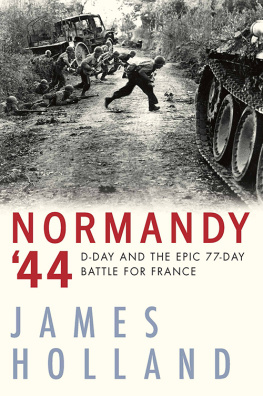D-DAY IN HISTORY AND MEMORY
The Normandy Landings in International Remembrance and Commemoration
Edited by Michael R. Dolski, Sam Edwards, John Buckley

Denton, Texas
2014 University of North Texas Press
All rights reserved.
Printed in the United States of America.
10 9 8 7 6 5 4 3 2 1
Permissions:
University of North Texas Press
1155 Union Circle #311336
Denton, TX76203-5017
The paper used in this book meets the minimum requirements of the American National Standard for Permanence of Paper for Printed Library Materials, z39.48.1984. Binding materials have been chosen for durability.
Library of Congress Cataloging-in-Publication Data
D-Day in history and memory : the Normandy landings in international remembrance and commemoration / edited by Michael Dolski, Sam Edwards, John Buckley. -- Edition: 1
pages cm
Includes bibliographical references and index.
ISBN 978-1-57441-548-3 (cloth : alk. paper) -- ISBN 978-1-57441-558-2 (ebook)
1. World War, 1939-1945--Campaigns--France--Normandy. 2. World War, 19391945--Campaigns--France--Normandy--Social aspects. 3. World War, 19391945--Historiography. 4. Nationalism and collective memory. I. Dolski, Michael, 1978 editor of compilation. II. Edwards, Sam, 1981 editor of compilation. III. Buckley, John (John D.), editor of compilation. IV. Dolski, Michael, 1978 Portal of liberation. V. Title: Portal of liberation.
D756.5.N6D23 2014
940.5421421--dc23
2013043836
The electronic edition of this book was made possible by the support of the Vick Family Foundation.
For the combatants of D-Day and the people of Normandy;
Those whose lives and experiences lie behind all of this memory work.
LIST OF FIGURES
ACKNOWLEDGMENTS
As those who commanded the D-Day invasion knew all too well, collaborative, transatlantic, ventures are a challenging enterprise in both planning and execution. This book was no exception. Admittedly, as editors our endeavor was of a rather different sort and scale to that of Ike in June 1944 (we used far fewer ships and hardly any aircraft at all...). But there were, on reflection, some uncanny connections. Our supreme commander throughout was American, Michael Dolski, and his lieutenants were both British: Sam Edwards and John Buckley (one is tempted to push the analogy as far as it will go and mark the former as a sort of Tedder figure, and the latter as a Monty; although it must be acknowledged that not once did John attempt to suggest we all join him in a dynamic drive through Belgium). And much like Overlord, there were the obligatory confusions and differences to overcome (what to do with that so troubling issue in Anglo-American relations, vowels). But, as we hope our readers will agree, the result of this transatlantic endeavor is an engaging and rewarding assessment of how one eventD-Dayhas been appropriated, adapted, and assimilated into six distinct national cultures.
The project began as a conference panel exploring comparative perspectives on the Normandy landings organized by Michael and Sam for the Society of Military Historys conference in 2010 (always a stimulating occasion) at the Virginia Military Institute (a fascinating venue). Soon after, Ron Chrisman of UNT Press contacted Michael expressing an interest in the panel and inviting us to submit a proposal for a book-length comparative study if we thought there was scope for it. We did, and leapt at the opportunity. But, as relatively junior scholars, we needed experience and wisdom to guide us, and we found both in Professor John Buckley, eminent military historian, scholar, and gentleman. With Johns involvement, we were ready to begin our search for the expert contributors necessary to the projects successful completion. Michael, an authority when it comes to D-Days place in American memory, was to deal with the American-focused chapter, while Sam, with interests in all aspects of war commemoration, was to take the British chapter. John, meanwhile, was to exercise a detached overview of the project, prompting and advising where necessary. But that still left four chapters in need of suitable authors, those dealing with Canadian, French, German, and Russian memory. Our approach to finding these authors was simple: we looked for those with the requisite knowledge and expertise to examine their subject matter with skill, care, and flare. Hence Terry Copp and Matt Symes for the Canadian chapter, Kate Lemay for the French chapter; Gnter Bischof and Michael Maier for the German chapter (which, due to Gnters unique skills and knowledge, also includes a consideration of Austrian memory), and Olga Kucherenko for the chapter exploring the view of D-Day from beyond the Urals.
As editors, we would like to take this opportunity to thank all these experts for agreeing to be involved in the project, and for the dedication and diligence with which they have undertaken their research and writing. Not once have we had to cajole, hurry, or encourage: our authors completed their assignments in good time, and in good order, and for this, our sincere thanks. On behalf of all of us (editors included) our thanks must also go to all those staff of the many different archival facilities in the United States, United Kingdom, Canada, France, Germany, Austria, and Russia whose documents and sources are recorded in the footnotes and bibliography. Our gratitude and appreciation must also go to our editor at UNT Press, Ron Chrisman, who has been unfailingly supportive throughout, guiding us through the challenges and pitfalls of edited collections. In so many respects, this project was his initiative, and for this, we thank him. For all of us too, family and friends have been understanding and accepting of the demands of scholarship, especially that which is, like this book, transatlantic and transnational. For their patience, indulgence, and interest, we thank them all.
It seems apt here to conclude with the words of GEN Eisenhower, words written on a scrap of paper on 5 June 1944, and thrust into his breast pocket where they stayed, never to be used for their original purpose. The words were for communication to his respective superiors should the invasion he had just ordered fail. He finished this brief note with the statement that If any blame or fault attaches to the attempt, it is mine alone. Likewise, therefore, while any success attributed to this project is certainly due to the efforts and expertise of our contributors, and to the help and guidance of Ron, any failings or faults, errors or inaccuracies, are ours, and ours alone.
Sam Edwards, Michael R. Dolski, John Buckley
August 2013
INTRODUCTION
MICHAEL R. DOLSKI, SAM EDWARDS JOHN BUCKLEY
Over the past seventy years, the Allied invasion of Northwestern France in June 1944 has come to stand as something more than a major battle in an increasingly distant war. The assault itself formed a vital component of Allied victory in the Second World War. The hard-fought invasion on that sixth day of June opened a new European battlefront that would expand during the ensuing eleven months into the heart of Germany and thereby help ensure the eventual destruction of Hitlers Nazi regime. Together, the military significance of the invasion and the broader social, political, and economic changes which accompanied European liberation and the end of the war, have ensured that D-Dayas the initial landing is traditionally termed (following military convention)has developed into a sign and symbol, especially in North America and Western Europe. Most importantly, as a word it carries with it a series of ideas and associations all of which, while linked, nonetheless have a degree of national and cultural specificity. This book, therefore, offers a study of these specificities. It explores the construction and reconstruction in the period since 1944 of at least six different D-Days: the stories of the landings as told by North Americans, Western Europeans, and Russians. As the subsequent chapters amply demonstrate, from high statesmen to everyday individuals, many different people have spent the post-war period invoking, interpreting, and (re)inventing D-Day for a variety of reasons. As with all instances of collective memory, there is a politics at play because the past serves to help make sense of the ever-changing present (an issue we examine in more depth below).
Next page
